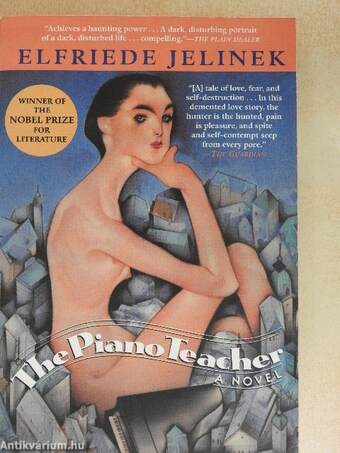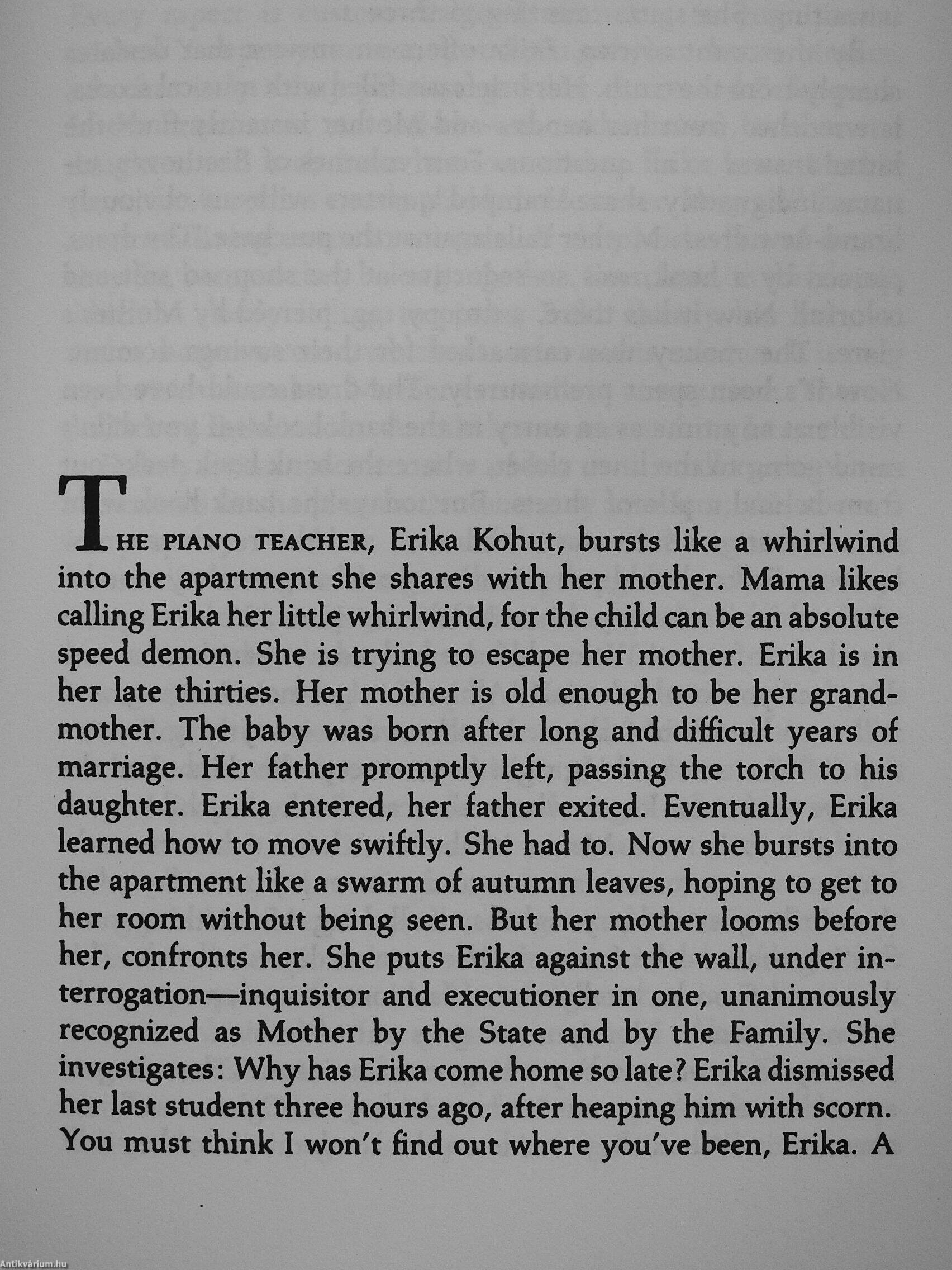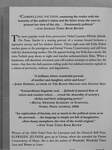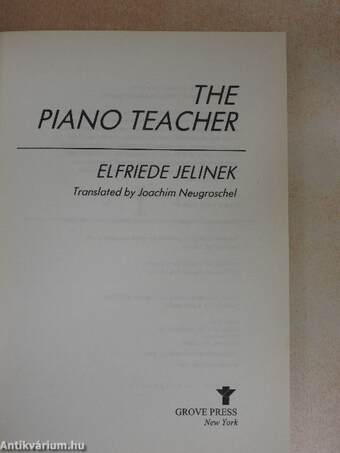1.067.104
kiadvánnyal nyújtjuk Magyarország legnagyobb antikvár könyv-kínálatát

VISSZA
A TETEJÉRE
JAVASLATOKÉszre-
vételek
The Piano Teacher
A Novel
| Kiadó: | Grove Press |
|---|---|
| Kiadás helye: | New York |
| Kiadás éve: | |
| Kötés típusa: | Ragasztott papírkötés |
| Oldalszám: | 280 oldal |
| Sorozatcím: | |
| Kötetszám: | |
| Nyelv: | Angol |
| Méret: | 21 cm x 14 cm |
| ISBN: | 978-0-8021-4461-4 |
naponta értesítjük a beérkező friss
kiadványokról
naponta értesítjük a beérkező friss
kiadványokról
Előszó
TovábbFülszöveg
"Compelling fiction, ensnaring the reader with the intensity of the author's vision and the bitter irony she uses to present her view of the city Passionately politicaL" —Los Angeles Times Book Review
'"T^he most popular work from provocative Nobel Laureate Elfriede Jelinek, JL The Piano Teacher is a searing portrait of a woman bound between a repressive society and her darkest desires. Thirty-eight-year-old Erika Kohut teaches piano at the prestigious and formal Vienna Conservatory, and still lives with her domineering mother. Her life appears boring, but Erika has a secret: she visits Turkish peep shows at night and watches sadomasochistic films. When a handsome, self-absorbed, seventeen-year-old student attempts to seduce her, she resists—but then the dark passions roiling under her subdued exterior explode in a release of perversity, violence, and degradation.
"A brilliant, bitter, wonderful portrait of mother and daughter, artist and lover." —John Hawkes, author of The... Tovább
Fülszöveg
"Compelling fiction, ensnaring the reader with the intensity of the author's vision and the bitter irony she uses to present her view of the city Passionately politicaL" —Los Angeles Times Book Review
'"T^he most popular work from provocative Nobel Laureate Elfriede Jelinek, JL The Piano Teacher is a searing portrait of a woman bound between a repressive society and her darkest desires. Thirty-eight-year-old Erika Kohut teaches piano at the prestigious and formal Vienna Conservatory, and still lives with her domineering mother. Her life appears boring, but Erika has a secret: she visits Turkish peep shows at night and watches sadomasochistic films. When a handsome, self-absorbed, seventeen-year-old student attempts to seduce her, she resists—but then the dark passions roiling under her subdued exterior explode in a release of perversity, violence, and degradation.
"A brilliant, bitter, wonderful portrait of mother and daughter, artist and lover." —John Hawkes, author of The Blood Oranges and Second Skin
"Extraordinary linguistic zeal Uelinek's] musical flow of voices and counter-voices reveal the absurdity of society's clichés and their subjugating power." —Royal Swedish Academy of Sciences, Nobel Prize address, 2004
"An exploration of fascism, not so much in the political sense as in the personal the language is simple yet full of imaginative, often-funny metaphors, the view of the world original." —New York Times Book Review
Winner of the 2004 Nobel Prize for Literature and the Heinrich Boll Prize, ELFRIEDE JELINEK grew up in Vienna, where she attended the Vienna Conservatory of Music. She is also the author of Wonderful, Wonderful Times-, Lust, and Women as Lovers. Vissza
Témakörök
- Idegennyelv > Idegennyelvű könyvek > Angol > Szépirodalom > Regény, novella, elbeszélés
- Szépirodalom > Regény, novella, elbeszélés > Az író származása szerint > Európa > Ausztria
- Szépirodalom > Regény, novella, elbeszélés > Tartalom szerint > Erotikus regények
- Szépirodalom > Regény, novella, elbeszélés > Tartalom szerint > Lélektani regények
- Szépirodalom > Regény, novella, elbeszélés > Tartalom szerint > Filmregények
- Szépirodalom > Regény, novella, elbeszélés > Irodalmi díjas szerzők > Nobel-díjasok
- Erotika > Szépirodalom > Regény, novella, elbeszélés
- Idegennyelv > Idegennyelvű könyvek > Angol
Elfriede Jelinek
Elfriede Jelinek műveinek az Antikvarium.hu-n kapható vagy előjegyezhető listáját itt tekintheti meg: Elfriede Jelinek könyvek, művekMegvásárolható példányok
Nincs megvásárolható példány
A könyv összes megrendelhető példánya elfogyott. Ha kívánja, előjegyezheti a könyvet, és amint a könyv egy újabb példánya elérhető lesz, értesítjük.







